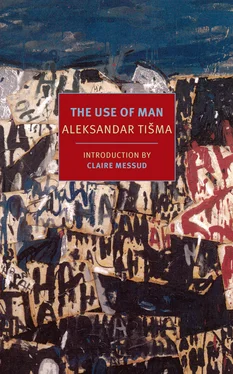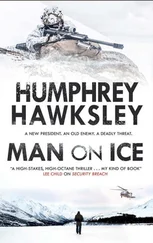Aleksandar Tišma - The Use of Man
Здесь есть возможность читать онлайн «Aleksandar Tišma - The Use of Man» весь текст электронной книги совершенно бесплатно (целиком полную версию без сокращений). В некоторых случаях можно слушать аудио, скачать через торрент в формате fb2 и присутствует краткое содержание. Год выпуска: 2014, Издательство: NYRB Classics, Жанр: Современная проза, на английском языке. Описание произведения, (предисловие) а так же отзывы посетителей доступны на портале библиотеки ЛибКат.
- Название:The Use of Man
- Автор:
- Издательство:NYRB Classics
- Жанр:
- Год:2014
- ISBN:нет данных
- Рейтинг книги:5 / 5. Голосов: 1
-
Избранное:Добавить в избранное
- Отзывы:
-
Ваша оценка:
- 100
- 1
- 2
- 3
- 4
- 5
The Use of Man: краткое содержание, описание и аннотация
Предлагаем к чтению аннотацию, описание, краткое содержание или предисловие (зависит от того, что написал сам автор книги «The Use of Man»). Если вы не нашли необходимую информацию о книге — напишите в комментариях, мы постараемся отыскать её.
A work of stark poetry and illimitable sadness,
is one of the great books of the 20th century.
The Use of Man — читать онлайн бесплатно полную книгу (весь текст) целиком
Ниже представлен текст книги, разбитый по страницам. Система сохранения места последней прочитанной страницы, позволяет с удобством читать онлайн бесплатно книгу «The Use of Man», без необходимости каждый раз заново искать на чём Вы остановились. Поставьте закладку, и сможете в любой момент перейти на страницу, на которой закончили чтение.
Интервал:
Закладка:
They were alone on the road as far as the eye could see, but when they turned around, they saw groups of soldiers and civilians moving away from the road and scattering in the direction of peasant houses. Again they heard the roar of engines and, without a word to each other, threw themselves into the field. Instinctively they ran toward the nearest house, but when they approached it, they saw men and women rushing out, taking cover in the bushes. “Over there!” Lazukić shouted to his son, running to a barn perched on posts, to the shelter of the knee-high space beneath it. In an instant they slid inside, and from there, panting, watched the road.
The noise came from beyond the hill in the road; then, at the top, something huge stood silhouetted against the sky, and when it came rolling down, they saw it was a tank, its front covered by a red flag bearing a crooked black cross. As they stared at that fluttering, miraculously clean red-and-black fabric, the tank slowly and steadily came so close that they could make out the face of the helmeted soldier standing in the turret. Another, smaller, vehicle appeared at the top of the hill, a motorcycle, its driver sitting tall in his seat, and next to him a second soldier, almost prone in the sidecar, his finger on the trigger of his machine gun. The tank rumbled ponderously along the road, followed by the motorcycle. “God, it’s the Germans!” a high-pitched woman’s voice cried out, and then a man’s voice said, as if in answer, “Yugoslavia’s done for.”
They crawled out from under the barn, shook the dust off their clothing, and walked over to the peasant house, which drew those same people who had minutes earlier abandoned it. A woman, probably the one whom Lazukić and his son had heard, sank on a bench by the wall and covered her face with her hands; a group of peasants and two soldiers gathered in front of her, watched her with curiosity. “What’ll we do with these?” One of the soldiers picked a rifle off the ground and held it by the barrel like a staff. The other continued to stare at the woman. The first soldier now turned to the peasants: “Is this your house? Can we bury the rifles here?” The second soldier gave a start. “Shut up, you fool!” he said, grabbed the rifle from his comrade, picked up his own, and carried them off behind the house. He disappeared among the fruit trees there, and when he returned, he no longer had the guns. “Come on,” he said to his comrade, tugging at his sleeve, and they were off, past the back yard and into the field, walking briskly, heads forward. They disappeared from sight at the first dip in the ground.
Lazukić and Sredoje also decided to leave. But as soon as they started walking, they found themselves at a loss as to which direction to take: trudging through the fields along unfamiliar paths made no sense to them, and going back on the road seemed too dangerous. They felt hungry and tired, and at the same time realized, to their surprise, that it was growing dark. They looked at their watches: it was almost six. The day had seemed endlessly long, yet was over quickly. They decided not to journey at night and returned to the yard in front of the house. They discovered that the peasants gathered there were also refugees and that the owner was hiding inside. They knocked on the door, went in, and found an elderly peasant with a large red mole on his cheek, who was lighting a fire. The smoke sharpened their hunger and they asked for food.
The peasant, turning his eyes away as if to protect them from the smoke, was silent for a moment, then said, “All I have is eggs, but they’re two dinars each now.” After Lazukić agreed to that astonishing price, the old man let them sit at the table and called in a woman. She was much younger, perhaps his daughter or servant, and silently prepared scrambled eggs and then cut two large slices of bread on the rough, bare table. Immediately after supper the peasant took them to a barn in back of the house, with barrels stored in one corner; he put down some clean straw for them and spread two worn blankets over it. They asked for water to wash their faces and feet. Lazukić hung his socks to dry by the window. Groaning, the two of them stretched out on the straw and covered themselves. They felt like kings: a fresh breeze drifted in through an open window; their numbed legs were at rest; from the road came the rumble of threatening vehicles, but here, within the walls of the barn, they felt temporarily safe. “Where is Rastko now?” Sredoje wondered out loud, drifting off to sleep. “In German-occupied territory,” his father answered. “You see how fast those devils move. We’ll find him tomorrow.” They fell asleep.
The next morning the cold roused them early, but their hosts were already up and about. They had breakfast, scrambled eggs again, and set off at once. The road was full, crowded with people moving in both directions: refugees and soldiers with no rifles. Abandoned cartridge belts lay in large piles on the roadside. Lazukić and Sredoje paused to get their bearings. “We must continue in the direction we were heading yesterday,” Lazukić said, “until we find Rastko and hear what’s going on in Belgrade.”
They had to pick their way through a mass of objects left lying on the road after the attack of the day before: crates, sacks, overturned carts, and here and there the corpse of a soldier pulled to one side, hands crossed on his chest. From the winding ribbed tracks, it was clear that the tanks, too, had circled the debris. Now the tanks were nowhere to be seen; it was as if they had simply traveled through and disappeared into the distance, but motorcycles spluttered by every few minutes, always with a sidecar and a crew of two Germans. The drivers no longer wore helmets, but tight, lightweight caps, and they passed the refugees and unarmed soldiers without so much as looking at them, focused instead on a task that had evidently been assigned them. The people on the road moved warily out of their way, lowered their voices, squinted at them uncertainly, and now and then a hand waved abashedly, an expression of gratitude and relief that no one was being harmed. The nearer Lazukić and Sredoje got to a town, the more Germans there were, and on the outskirts of Ub a whole column of German trucks was lined up along the edge of the road. Their crews, sprawled on the grass, eyes half-closed against the sun, were breakfasting on canned food and beer. The people passing looked in amazement at these enemies comfortably installed and enjoying themselves, as if disbelieving this evidence of their humanity; a crowd of children stood staring at them, sucking their thumbs. Lazukić looked at them too and remarked, “They don’t go hungry, like our men.”
The town of Ub seethed with people; now that the danger was over and they were out of hiding, everyone was eager to stretch his legs and size up the new situation. The shops were closed. The first inn Lazukić and Sredoje came across was full to bursting. Lazukić fought his way to the counter behind which the hefty, bare-chested proprietor, with eyebrows thick as mustaches, was serving slivovitz.
“Good morning,” Lazukić shouted above the noise of the customers. “I’m looking for my son. A student. He must have passed through here yesterday afternoon.”
The proprietor put down the bottle of slivovitz. “Where are you from?”
“Novi Sad. We were separated from my elder son en route.”
“A student, you say?”
“Yes, a student.”
“They say there’s a student lying in the church. A schoolboy, more like.”
“How do you mean, lying in the church?” Lazukić stammered, clutching the counter, because his legs were giving way.
“How? The planes killed him, the soldiers carried him into the church.”
Lazukić stared with a completely blank expression, then turned and, without looking left or right, rushed out. Sredoje, who had only half heard the proprietor’s answer amid the clamor, followed. But he couldn’t catch up with his father in the crowded street. He bumped into people just as his father did a few steps ahead, lost sight of him, spotted him talking to someone; then his father disappeared again, diving headlong into the crowd. Sredoje reached a square and saw the broad façade of a freshly whitewashed church and, in front, his father alone, arms spread wide, rushing in through the open doorway.
Читать дальшеИнтервал:
Закладка:
Похожие книги на «The Use of Man»
Представляем Вашему вниманию похожие книги на «The Use of Man» списком для выбора. Мы отобрали схожую по названию и смыслу литературу в надежде предоставить читателям больше вариантов отыскать новые, интересные, ещё непрочитанные произведения.
Обсуждение, отзывы о книге «The Use of Man» и просто собственные мнения читателей. Оставьте ваши комментарии, напишите, что Вы думаете о произведении, его смысле или главных героях. Укажите что конкретно понравилось, а что нет, и почему Вы так считаете.












